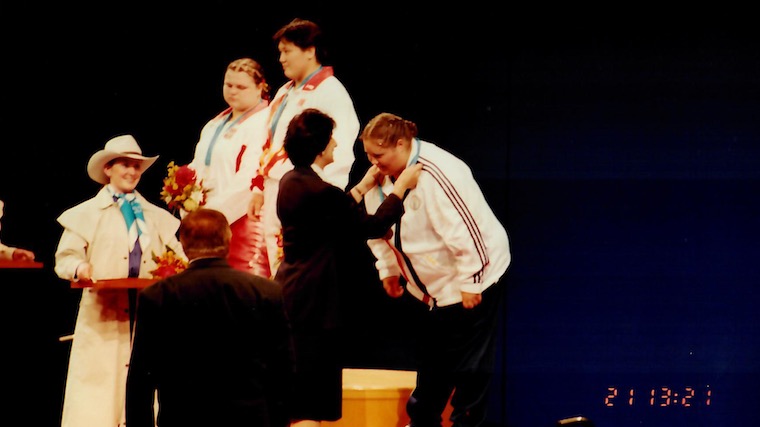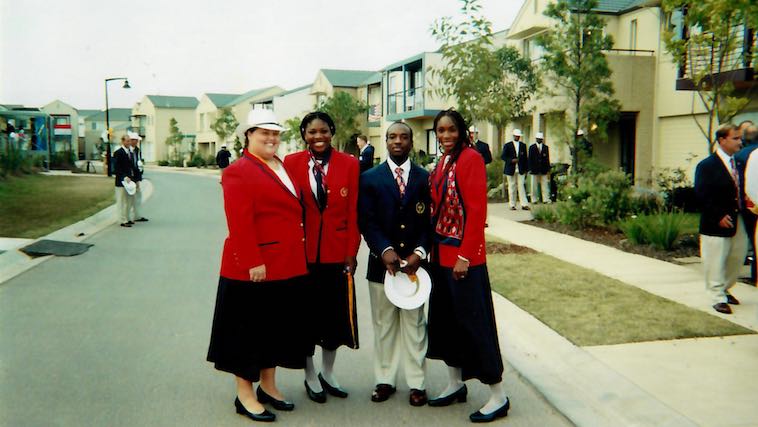The Olympics kicked off in Atlanta in 1996, the year I started to lift weights. At the time, I didn’t think too much about the significance, and I didn’t pay attention to that year’s weightlifting competition. A 13 years old, I was much more occupied with building tree houses in the swampy woods surrounding my home in Georgia. The legendary Olympic battle between Naim Suleymanoglu and Valerios Leonidis wasn’t on my mind, even though it occurred in my home state.
I walked into a weightlifting facility for the first time that August, decked out in jean shorts and a t-shirt stained with pine sap. In hindsight, it felt like being yanked aboard a rocket ship moments before take off: I was a little confused, a little excited, not even wondering or caring what the mission was. I didn’t know at the time there was to be no return trip; this was a one-way ticket on a journey that had as much to do with circumstance, as my underdeveloped teenage brain that never signaled anything special to me. The mission was important, I knew that. So I strapped in, with some vague understanding that it was too late to stop the countdown. From the minute I started weightlifting, my life took on an entirely different trajectory.
The 2000 Sydney Olympics
Four years after I started weightlifting, I qualified for my first Olympic Games in Sydney; it was the first year women could compete in weightlifting at the Olympic Games. At age 17, I managed a six for six performance, a handful of American records, and a bronze medal. I was a senior in high school at The Savannah Arts Academy, and I remember being thrilled to be in Australia instead of math class.

It’s actually one of my most distinct memories of that trip, and another glimpse into that teenage mind, which desired nothing more than to be experiencing new places and exploring everything without boundaries. I think I’ve come to realize that it wasn’t in spite of this but because of this that I was able to succeed at that competition. I simply couldn’t grasp that I wasn’t supposed to.

The 2008 Beijing Olympics
After that, eight years and another Olympic Games went by. Along the way there were major injuries, the abuse of trust, and enough time to nurture some self destructive habits. I felt like I was learning more, yet capable of less, as my body and mind refused to work together.
By the time I found myself in San Jose, California at 2008 Olympic team processing, I had finally discovered the struggle, bitterness and all the quit I had in me. I was the most injured and uninspired l’d ever been leading into competition, and it would stand as one of my poorest performances ever. Not knowing exactly how bad it was going to be yet, I sat in a small auditorium with my fellow Olympians, one of the first waves to go over to Beijing, listening to talk of what to expect as we travelled to China and lived together for the next several weeks.
Competing in 2000 and 2004, I’d heard it all before, and though I was politely listening, I was also nestled in a fog of my own impending doom. Then the lights in the theater went down, a DVD began to play, and historic moments of Olympic triumph, desperate struggle, and grace illuminated the dark room. Coming to me with the measured wisdom and comfort of a mother, I heard Dr. Maya Angelou’s voice. She wrote a poem for that Games, and I was in need of inspiration. This is not the poem in its entirety, but a few of its words I remember well that she spoke:
“…Brothers and Sisters, Yes, try. Then try harder.
Lunge forward, press eagerly for release.
The amazement which awaits is for you…
With respect for the world and its people,
We can compete passionately without hatred.
With respect for the world and its people,
We can take pride in the achievement of strangers.
With respect for the world and its people,
We can share openly in the success of friends.
Here then is the Amazement
Against the odds of impending war
In the mouth of bloody greed
Human grace and human spirit can still conquer…”
I was moved, and though I knew not even Dr. Angelou’s words could add 40 kilograms to my snatch and clean & jerk, it gave me the gift of perspective when I needed it the most. I had the memory of triumph, but I was hopeless to access it; I was going to have to dig deeper within myself than I ever had to muster a performance that I knew was going to feel awful. But it takes just as much effort to prove that you can as it takes to prove you cannot, because it’s the same journey. I had just forgotten which I was struggling toward. It didn’t entirely come into focus just then, but I was about to get the full Olympic experience, whether I wanted it or not. That includes its glorious highs and its miserable lows. But wasn’t that the whole point? I learned I could not come to fully appreciate one without the other.
[Related: What Olympic quota cuts mean for athletes and fans.]
Looking Ahead: What the Olympic Games Can Mean
The Games in 2021 will be strange to us in some ways, I’m sure. However, I don’t need a ticket to Tokyo to recognize that this Olympics will be full of the same energy the athletes bring to it each time. The entire event exists for struggle, and it calls for uncertainty.
Its specialty is to provide us with any number of outcomes and the exciting prospect of newly discovered heroes. I will watch the competition this year with the same affection and nostalgia I always do, with our shared struggles in mind. No doubt there will be champions made and lost, but that by itself wouldn’t make this competition unique. To the athletes who will be part of the 2020 (+1) Olympic Games, the atmosphere of uncertainty can exist at the same time you compete with certainty, purpose, intention, and the recognition that results have not yet been written. As my good friend and fellow multi-time Olympian Chad Vaughn says, “Someone has to win, so it might as well be you.”
Editor’s note: This article is an op-ed. The views expressed herein and in the video are the author’s and don’t necessarily reflect the views of BarBend. Claims, assertions, opinions, and quotes have been sourced exclusively by the author.